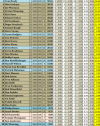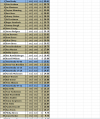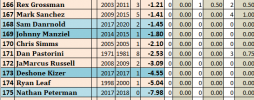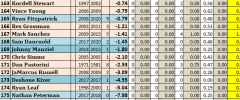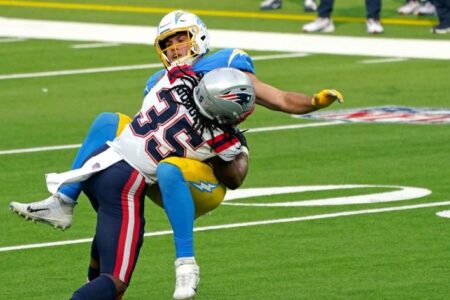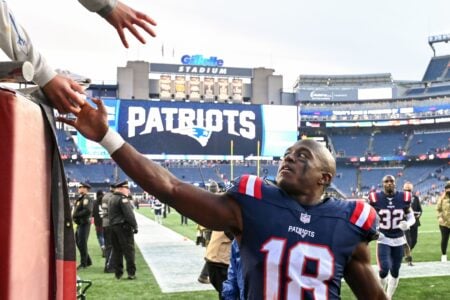- Joined
- Apr 3, 2006
- Messages
- 26,101
- Reaction score
- 52,115
@Bleedthrough
@Deus Irae
@Tony2046
Here's an update on my QB rank project that I mentioned earlier. I saw some half-assed thing on Profootball-reference that was supposed to be a Hall of Fame monitor, and it was really bad, inconsistent, and made no sense; and not only that, I started reading the comments and saw it was the same morons from 2003 still pimping out Manning > Brady, so I decided to make my own.
The rankings are based entirely on input data with a few small exceptions of giving a few prorated seasons (see notes.) And I think the weight I've applied to the data is accurate as a HoF monitor because as you can see, the list has actual Hall of Famers in gold and has a very clear cutoff at #38. The first 37 are all either in the Hall of Fame or not eligible yet but likely. Tony Romo is the first guy to miss the cut (and makes me think people may be surprised when a debate begins about him...because it probably will in a few years). After that, if you look down the list, there's only a few scattered Hall of Famers who are in for special reasons (Moon basically being given full credit for all those CFL Championships, Namath's guarantee and NY media bias, some old timers.)
I have an adjuster on the left, which allowed/allows me to fine tune it. So, there are three major indexes: the Windex, the Trophydex, and the Ratedex. How much you want each to make an impact will change the rankings a bit to favor winning championships, accolades, passer rating, etc. But the thing is that most of these Hall of Famers have all of these things so it often just changes a few slots but nothing major. The way I have it now, I think it's pretty balanced. I worked on it this week and found some things didn't look right, some guys too high and others too low. I found a pretty weird solution to the problem, which was to bring Dan Marino (who was at the time ranked near #25) and Terry Bradshaw (who was ranked near #8) together as a compromise in the middle at 16 and 17. I think most people would have these two close to each other in their rankings, but they have pretty opposite resumes. And in fact both are pretty frustrating to rank because you're looking for objective stats/accolades to put Marino up the list and objective ways to put Bradshaw down the list, but you don't want to open the can of worms of subjectively modifying, awarding statistical milestones, or turning to counting stats (shuddering at the thought), etc. You can only work with what you have or you'll ruin the entire ranking system. Tarkenton and Aikman also wound up next to each other at 24/25, a similar contrast pair.
So, here are the data points that I put in:
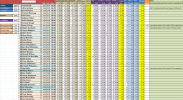
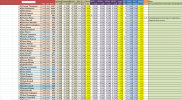
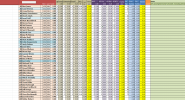
Oh...one last thing that is really freaking cool...the rivalries between the guys at the top of the list who are all close to each other:
Brady-Manning (well, not close anymore, but you know)
Unitas-Starr (Starr won most of the head-to-heads; no doubt that changed the rankings)
Luckman-Baugh (this was another great rivalry; Luckman was also a defensive back, do-everything athlete credited for big innovations in the passing game...Baugh gets most of the legacy talk, but Luckman wins objectively in almost all categories; that rivalry included the 73-0 game btw)
Brees-Rodgers (kind of a sad rivalry...lol)...and of course, Favre-Rodgers.
Favre-Young
Bradshaw-Staubach
All in all, that's almost everyone in the top 15...pretty crazy.
@Deus Irae
@Tony2046
Here's an update on my QB rank project that I mentioned earlier. I saw some half-assed thing on Profootball-reference that was supposed to be a Hall of Fame monitor, and it was really bad, inconsistent, and made no sense; and not only that, I started reading the comments and saw it was the same morons from 2003 still pimping out Manning > Brady, so I decided to make my own.
The rankings are based entirely on input data with a few small exceptions of giving a few prorated seasons (see notes.) And I think the weight I've applied to the data is accurate as a HoF monitor because as you can see, the list has actual Hall of Famers in gold and has a very clear cutoff at #38. The first 37 are all either in the Hall of Fame or not eligible yet but likely. Tony Romo is the first guy to miss the cut (and makes me think people may be surprised when a debate begins about him...because it probably will in a few years). After that, if you look down the list, there's only a few scattered Hall of Famers who are in for special reasons (Moon basically being given full credit for all those CFL Championships, Namath's guarantee and NY media bias, some old timers.)
I have an adjuster on the left, which allowed/allows me to fine tune it. So, there are three major indexes: the Windex, the Trophydex, and the Ratedex. How much you want each to make an impact will change the rankings a bit to favor winning championships, accolades, passer rating, etc. But the thing is that most of these Hall of Famers have all of these things so it often just changes a few slots but nothing major. The way I have it now, I think it's pretty balanced. I worked on it this week and found some things didn't look right, some guys too high and others too low. I found a pretty weird solution to the problem, which was to bring Dan Marino (who was at the time ranked near #25) and Terry Bradshaw (who was ranked near #8) together as a compromise in the middle at 16 and 17. I think most people would have these two close to each other in their rankings, but they have pretty opposite resumes. And in fact both are pretty frustrating to rank because you're looking for objective stats/accolades to put Marino up the list and objective ways to put Bradshaw down the list, but you don't want to open the can of worms of subjectively modifying, awarding statistical milestones, or turning to counting stats (shuddering at the thought), etc. You can only work with what you have or you'll ruin the entire ranking system. Tarkenton and Aikman also wound up next to each other at 24/25, a similar contrast pair.
So, here are the data points that I put in:
- WINDEX: League Championships, Championships Appearances, Playoff Wins & Franchise (a formula using winning percentage). The first three are self-explanatory, but I should mention that Playoff Wins are ideal because they bridge pre-merger and post-merger. They give the modern QBs more opportunity to rack up points because it's harder to win it all. Franchise is a stat I created which is based on winning percentage and years played; it gives some points just for playing (winning at .60 like most QBs) but really rewards guys for long-term dominance.
- TROPHYDEX: MVP, All-Pro, All-Star, All-NFL (that's all-decade or NFL100 team.) These are self-explanatory and just weighted. All of the rankings here are based on the idea that they're connected, so an MVP isn't worth more than an All-Pro because if you win an MVP, you're also winning an All-Pro and and All-Star, so all together that's a lot of points (same with championships, appearances, and playoffs.)
- RATEDEX: I used a simple passer rating for every player on this one. There are definiteliy better measures of QB skills, but this isn't looking to be precise but just to get a general level of play. It's important to note, for example, a major difference in passer rating between two guys playing in the same era (Young/Aikman, Staubach/Bradshaw.) I created a formula which does two things with passer rating...first, it assigns points for pure passer rating, in a vaccuum, so basically you're just saying how is this guy compared to the most average QB in NFL history playing in 1963 with a passer rating of 72.3. That leads to recency bias, so the other half of it, the heavier weighted half, is to compare passer rating to the average of that era. It was pretty easy to calculate this (on average, passer rating goes up about 0.5 per year). Both of these categories are adjustable for fine tuning. But please note that by adjustments, I mean must apply to all, so there's no selective changes. After tuning it, I I was satisfied that Eli Manning was no longer a top 30 QB, the Hall of Fame index was aligned, Rodgers and Brees were neck and neck, Mahomes was 26 (seems right), and of course, Montana was ahead of Manning. After all this seemed aligned, it was really interesting to look at the sub-Hall of Fame guys and how the formula works to separate them out. I'm not sure it's right or not. That's when you really notice how finely tuned it is; the Hall of Fame guys are easier to rank because they have such big resumes.



Oh...one last thing that is really freaking cool...the rivalries between the guys at the top of the list who are all close to each other:
Brady-Manning (well, not close anymore, but you know)
Unitas-Starr (Starr won most of the head-to-heads; no doubt that changed the rankings)
Luckman-Baugh (this was another great rivalry; Luckman was also a defensive back, do-everything athlete credited for big innovations in the passing game...Baugh gets most of the legacy talk, but Luckman wins objectively in almost all categories; that rivalry included the 73-0 game btw)
Brees-Rodgers (kind of a sad rivalry...lol)...and of course, Favre-Rodgers.
Favre-Young
Bradshaw-Staubach
All in all, that's almost everyone in the top 15...pretty crazy.
Last edited:




